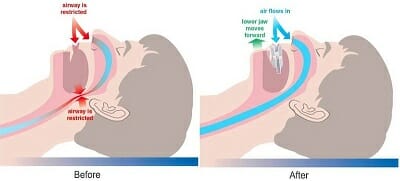All About Stop Snoring Pills
 In western medicine, we have a pill for nearly every ailment, so it’s quite common for people to seek a pill or tablet for one of the most common issues faced in the American household – snoring.
In western medicine, we have a pill for nearly every ailment, so it’s quite common for people to seek a pill or tablet for one of the most common issues faced in the American household – snoring.
With no shortage of demand for such a product, several companies have stepped up to the plate and seized the opportunity to provide a snoring solution that comes in a pill form. The claim is that popping a pill or two before bed will allow you and your partner to enjoy a quiet night of sleep without the sound of snoring. Do stop snoring pills really work or are they simply another snake oil? We will closely examine stop snoring pills and offer our recommendation on the use of them.
What Exactly Are Stop Snoring Pills?

Anti-snoring pills have been sold under various names such as Snorestop, Snoring Shush, and Snorez. Most products claim to be a homeopathic snoring solution that is safe to use and recommended by pharmacist and doctors. Some even claim to have published medical research proving their effectiveness although we were unable to locate any such research.
What exactly do snoring pills contain that stops snoring? While some manufacturers list their ingredients others give little to no information and state that the ingredients are “proprietary”.
The majority of pills and tablets contain herbal ingredients that are mixed together in somewhat of a bizarre fashion. Examples of ingredients often found in snoring pills are Belladonna, Ephedra Vulgaris, Histaminum Hydrochloricum, Hydrastis, Magnesium Stearate, Gambir, and Cassia. Some ingredients such as Belladonna can be toxic at certain levels, although they are commonly diluted enough for homeopathy use.
Anti-snoring pills are typically inexpensive, ranging in price from $10-$20 for a 30 day supply.
How Do They Work?
How exactly does a stop snoring pill work? There are usually one of two different claims that are commonly offered by manufacturers who sell such products.
In some cases, snoring is caused by inflamed nasal passages and airway. With inflammation, breathing is often restricted which can actually cause the sound of snoring. This occurs when air tries to make it’s way through a narrow opening, causing the surrounding airway tissue to collide with each other. Some of the herbal ingredients that are often listed are known to help reduce inflammation. By eliminating inflammation, the airway opens up and the sound of snoring ceases.
Other products claim to work by reducing the amount of mucus in the airway and nasal passages. The reason why this approach may work is that mucus, especially mucus that is excessive and thick, within the airway but may actually cause airway tissue to stick together.
Do Snoring Pills Actually Work?
How far fetched are these claims? Can an herbal blend that reduces inflammation and keeps mucus at bay really help to reduce or eliminate snoring? The answer is yes, it’s possible but it is unlikely to work for most people. The reason being is that while reducing inflammation and mucous does help with snoring, snoring pills are unable to confront the most common area in which snoring occurs.
In the majority of cases, snoring is caused when breathing becomes restricted due to a partially collapsed airway which restricts airflow. There are a number of reasons why the airway becomes collapsed although age and excessive weight are often to blame. As we age, the muscles within our airway lose tone especially while asleep. Being overweight, especially in the neck area, will place additional strain on the airway. Being older and overweight place you at high risk for snoring.
While snoring pills can reduce airway inflammation, such herbal remedies are unable to open an airway that’s essentially pinched off due to a relaxed jaw and tongue. The area of restriction is evident when you look at the illustration below which shows the area in which snoring typically originates.
Alternatives To Snoring Pills
 Correcting a snoring problem begins by addressing the problematic area in which snoring typically develops. The Mandibular Advancement Device or Snoring Mouthpieces does just that.
Correcting a snoring problem begins by addressing the problematic area in which snoring typically develops. The Mandibular Advancement Device or Snoring Mouthpieces does just that.
Snoring Mouthpieces are typically made from a thermoplastic material and resemble mouthpieces that are often worn by athletes. While they may appear similar in nature, they are quite different when it comes to design.
A sports mouthguard simply acts as a buffer between teeth to prevent teeth injury during contact sports. A mouthguard that is specifically designed to prevent snoring is made to hold the jaw slightly forward which opens the airway and prevents resistance. With the muscles in this area tight, the airway becomes unrestricted and lose tissues do not flap against each other. No restriction. No Flapping. No Snoring.
There’s a similar product called a tongue retaining device which actually holds the tongue forward and performs the same function. Both products have lots of medical research confirming their effectiveness.
Just how effective are they? Most studies that have been conducted suggest that snoring mouthpieces at least 75% or greater in effectiveness, making it the most effective snoring solution currently available.
Alternatively, if you are overweight, the most natural way to prevent snoring is to lose some weight. Fat that is stored in the neck area places strain against an airway that is already weakened by age. Those who are overweight typically experience a desirable decrease in snoring by losing as little as 10% of their body weight. In addition to helping with a snoring problem, weight loss may also help to reduce blood pressure as well as lower your risk for diabetes and heart disease. Weight loss should be the ultimate goal but snoring aids can be a helpful way to control snoring in the meantime.
Should I Try Stop Snoring Pills?
 Looking at the low cost and ease of use offered by snoring pills, it’s very enticing to give them a try but is it they worth trying?
Looking at the low cost and ease of use offered by snoring pills, it’s very enticing to give them a try but is it they worth trying?
The use of snoring pills may reduce sinus symptoms such as excessive mucus buildup and some inflammation which can, in fact, contribute to snoring. Unfortunately, sinus congestion is one of the least likely contributors to snoring. Simply stated, anti-snoring pills are unlikely to resolve a snoring problem.
Unless you are able to locate a manufacturer who offers a money back guarantee, I recommend skipping over snoring pills and choosing a snoring mouthpiece which has been clinically proven to work. I’ve tested several different mouthpieces and can attest that they do in fact work. This site will help you choose a mouthpiece that will be a good fit. When choosing a mouthpiece, an important consideration should be whether or not you are a mouth breather. Those who are able to breathe freely through their nose may want to consider a TSD while all others will be better off going with a MAD.
Share This Post: